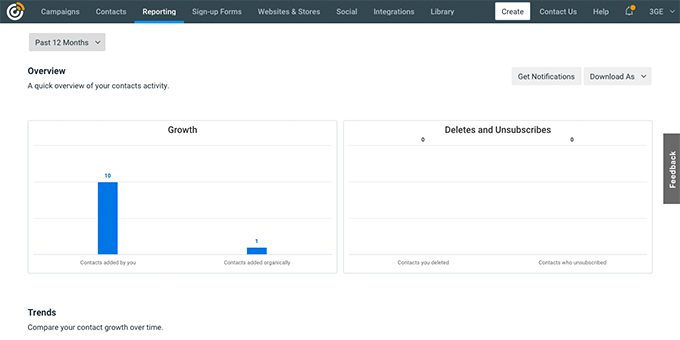We highly recommend that our users refrain from using WordPress to send out newsletter emails. Certain WordPress plugins offer the option to utilize WordPress’s built-in PHP mail feature for this purpose. However, many beginners opt for this method due to its lower costs.
In this piece, we will elaborate on why this approach is ill-advised and why it is crucial to avoid using WordPress for sending out newsletter emails.

It is important to give serious consideration to your email list
Your email list is a highly dependable communication tool that can help you attract users back to your WordPress website, ultimately leading to increased sales, leads, and conversions.
If you haven’t already, it’s crucial to start building your email list as soon as possible.
You’ll likely find that most experienced marketers, bloggers, and business professionals recommend using an email marketing service like Constant Contact, Brevo (formerly Sendinblue), HubSpot, or Omnisend instead of relying solely on WordPress for email newsletters.
You may be wondering why this is the case, especially if WordPress is capable of sending emails on its own. Let’s explore the reasons why.
Reliability

Your email list is a dependable communication tool that can help you attract users back to your WordPress website, leading to increased conversions, sales, and leads. If you haven’t already, it’s essential to start building your email list immediately. Most marketers, bloggers, and business experts recommend using email marketing services like Constant Contact, Brevo (formerly Sendinblue), HubSpot, or Omnisend instead of relying on WordPress for email newsletters.
You may be wondering why you should use a third-party service when WordPress can send emails itself. However, when you use a newsletter plugin that relies on PHP and WordPress email functions, there’s a high chance that your emails will end up in your user’s spam folder. Email providers like Gmail and Outlook have spam tools that mark emails as spam for various reasons, such as checking for an SPF record to determine if the sending server is authorized to send messages. They also look for suspicious behavior, words, and phrases to rule out spam and check their databases for suspicious IP addresses. On shared WordPress hosting, your website shares the same server IP address with several other websites, and any abuse by one person on that server can trigger spam-catching databases, making email delivery doubtful. There are countless other factors that spam-capturing algorithms check, making it challenging to satisfy them all. In contrast, professional email marketing service providers work tirelessly to ensure that their emails reach your users’ inboxes.

A rigorous set of guidelines is implemented to guarantee that all outgoing emails are delivered to the recipient’s inbox and not marked as spam. To achieve this, they employ a team of skilled engineers, developers, and support personnel who work tirelessly around the clock. They are also recognized and authorized bulk mail service providers for the majority of major ISPs and email services. When a user’s email server receives an email from a white-listed server, they can be confident that it is trustworthy and not spam. The dependability and ability to deliver alone are the most critical factors that should persuade you to use a professional newsletter service.
Restrictions and Delays in Email Delivery

Numerous WordPress hosting companies offer email services for creating a business email address or sending important notifications such as WordPress password reset. However, these companies have strict limitations on the number of emails that can be sent at once, as they consider mass emailing to be an abuse of their mail servers.
If you attempt to queue outgoing emails using a newsletter plugin or script, your hosting provider will eventually detect and block these processes. In some cases, they may even suspend your hosting account for violating their terms of service.
Fortunately, professional email marketing services eliminate these limitations. They have servers located worldwide, sending hundreds and thousands of emails daily. Additionally, they offer flexible plans that allow you to easily upgrade as your email list grows.
Ease of Use
Constant Contact and Brevo are examples of email service providers that offer simple and efficient ways to create and send emails to your subscribers. Their user-friendly tools make it effortless to design and customize your emails.
Moreover, they offer API integration that enables you to seamlessly connect your email list with other valuable WordPress plugins such as OptinMonster, WPForms, SeedProd, and many others.
By managing your own newsletter, you forfeit the benefits of these tools that streamline your workflow. Instead of focusing on expanding your business, you may find yourself grappling with tasks that can be accomplished in mere minutes with a reliable email marketing service.
Statistics and analytics
Integrated statistics and analytics are provided by professional email service providers for your campaigns. These metrics include the number of emails delivered to the user’s inbox, the number of emails opened, and the number of clicks received. This information enables you to enhance and modify your campaigns as needed.

If you send out your own newsletter using a newsletter plugin, it’s impossible to determine how many emails were delivered to the user’s inbox, opened, or clicked.
To obtain more data, you’ll need to incorporate Google Analytics into your email campaigns and landing pages. However, the information you can collect will still be restricted.
Using an email service provider has another benefit: some of them provide diagnostic and analysis tools.
You can use these tools to monitor the success of your campaigns. If your emails are being flagged as spam, you can identify the cause of the spam check tools’ detection.
Compliance Issues

The realm of email marketing is vast, but so is the issue of spam. To combat this problem, internet service providers and email marketing services have implemented new laws, regulations, and protocols.
When utilizing a professional email service to distribute your newsletter, you can rest assured that compliance with various regional regulations is being taken care of.
These email service providers put forth great effort to ensure their service adheres to privacy and anti-spam laws in different countries.
However, if you are sending out your own newsletter, you may not be aware of any new developments in the realm of email spam protection.
Cost Effectiveness

Some users may believe that by using a plugin to run their own newsletter, they can save money.
However, it is important to consider the value of your time. The time spent configuring a newsletter plugin is more valuable than the cost of a reliable email service.
Fortunately, there are options such as Constant Contact, which offers a free two-month trial with our Constant Contact coupon. This trial period provides ample time to set up and begin collecting email addresses, allowing your email list to become self-sustaining by the end of the trial.
Similarly, Brevo offers a free account that allows for up to 300 daily emails. Additional emails and tools can be accessed by upgrading the account.
What Email Service Should You Utilize for Sending WordPress Newsletters?
Our top recommendation for sending WordPress newsletters is Constant Contact, which is widely regarded as the best email marketing service for small businesses and blogs. It offers user-friendly features such as email automation, subscriber segmentation, customizable templates, and comprehensive analytics.
If you’re looking for more advanced marketing features and tools, you may also want to consider Brevo (formerly known as Sendinblue) or Drip. These providers offer a range of advanced options to help you optimize your email campaigns.
What if I have a strong preference for using WordPress to send out email newsletters?
There are some users who find the costs of email marketing service providers to be too high. In such cases, they often inquire if it’s feasible to send email newsletters using WordPress.
The answer is affirmative.
If we were to do it, we would only set it up using the FunnelKit Automation plugin for WordPress, in conjunction with WP Mail SMTP.
This is the sole solution that we have discovered to be dependable for sending email newsletters through WordPress.